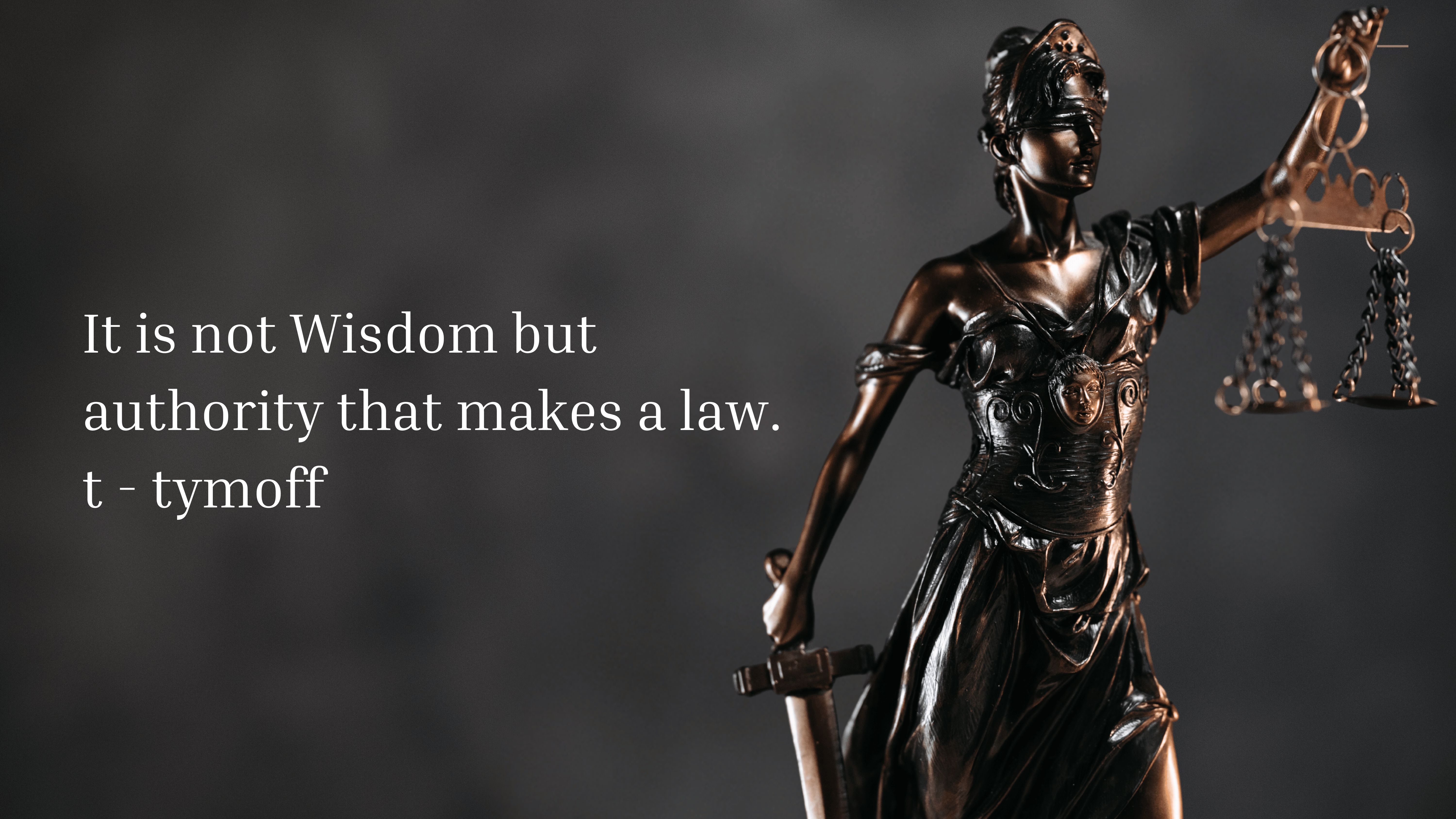The phrase “It is not wisdom but authority that makes a law” by T. Tymoff presents a provocative perspective on the nature of law and governance. This statement challenges the conventional belief that laws are founded on collective wisdom and ethical considerations, suggesting instead that the power to enact and enforce laws rests primarily in the hands of those who hold authority. In this article, we will delve into the implications of this viewpoint, exploring how authority shapes legal systems, the balance between wisdom and authority, and the broader societal impact of authority-driven laws.
The Perception of Wisdom in Laws
Traditionally, laws are perceived as products of societal wisdom, reflecting a collective understanding of justice, morality, and the common good. The idea is that through deliberation and ethical reasoning, lawmakers can create regulations that benefit society as a whole. However, Tymoff’s assertion challenges this notion, implying that the real driving force behind laws is not wisdom but authority. This raises questions about the true origins of our legal frameworks and whether they genuinely serve the interests of the populace or merely reinforce the power of the ruling class.
Also Read: Learn to Sit Back and Observe: Not Everything Needs Your Reaction – Tymoff
Authority’s Role in Legislation
Authority plays a pivotal role in the creation and enforcement of laws. In many political systems, especially democratic ones, elected representatives are vested with the authority to legislate on behalf of the people. However, the influence of authority extends beyond mere legislative power. It encompasses the ability to enforce laws through various means, including law enforcement agencies and judicial systems. This concentration of power often means that laws reflect the interests and priorities of those in authority rather than the collective wisdom of society.
The Impact on Society
The dominance of authority in lawmaking can have profound implications for societal well-being. Laws crafted without the tempering influence of wisdom may perpetuate systemic injustices and exacerbate disparities in wealth, power, and access to resources. This can lead to an erosion of public trust in governmental institutions and the rule of law, breeding cynicism and discontent. Furthermore, when laws prioritize authority over ethical considerations, democratic values and civil liberties may be undermined, posing a threat to the principles of justice and equity.
Balancing Wisdom and Authority
While authority is essential for maintaining order and enforcing laws, wisdom plays a crucial role in ensuring that these laws are just and equitable. The ideal legal system strikes a balance between authority and wisdom, creating laws that are both enforceable and reflective of ethical principles. This balance is not easily achieved, as it requires robust democratic institutions, active civic engagement, and a commitment to ethical governance. By integrating wisdom into the lawmaking process, societies can create legal frameworks that promote justice, protect individual rights, and foster social harmony.
Case Studies: Authority and Wisdom in Lawmaking
The United States Constitution
The United States Constitution is an example of an attempt to balance authority and wisdom. The framers of the Constitution established a system of checks and balances to prevent the abuse of authority, ensuring that laws reflect both the power of the state and the ethical principles of justice and liberty. The Bill of Rights, for example, safeguards individual freedoms against governmental overreach, demonstrating the interplay between authority and wisdom in the American legal system.
The Nuremberg Trials
The Nuremberg Trials, held after World War II, highlight the importance of balancing authority with wisdom. While the trials were established by the authority of the Allied powers, they were guided by principles of justice and accountability. This landmark event set a precedent for prosecuting crimes against humanity, emphasizing that legal authority must be exercised with ethical considerations in mind.
Also Read: I Fear No One, But Respect Everyone – Tymoff: A Guiding Principle for Life
The Role of Deliberation and Discourse
Deliberation and discourse are fundamental to integrating wisdom into the lawmaking process. When lawmakers engage in thoughtful discussion and debate, they can consider diverse perspectives, weigh different arguments, and make informed decisions. This process helps ensure that laws are not hastily crafted but are instead the result of careful deliberation aimed at serving the greater good. Through open dialogue and constructive discourse, societies can create laws that reflect their values and promote justice and equity.
Conclusion: Beyond the Dichotomy
The relationship between authority and wisdom in lawmaking is complex and multifaceted. While authority is necessary for the enforcement of laws, wisdom ensures that these laws are just and equitable. Striking a balance between these two forces is essential for creating a legal system that serves the interests of all members of society. As we navigate the complexities of governance, let us strive to harmonize authority with wisdom, forging a path toward a just, equitable, and harmonious society.
In conclusion, T. Tymoff’s statement “It is not wisdom but authority that makes a law” invites us to critically examine the foundations of our legal systems. By acknowledging the role of authority while advocating for the integration of wisdom, we can work toward a more just and effective legal framework that upholds the principles of justice and equity for all.














Leave a Reply